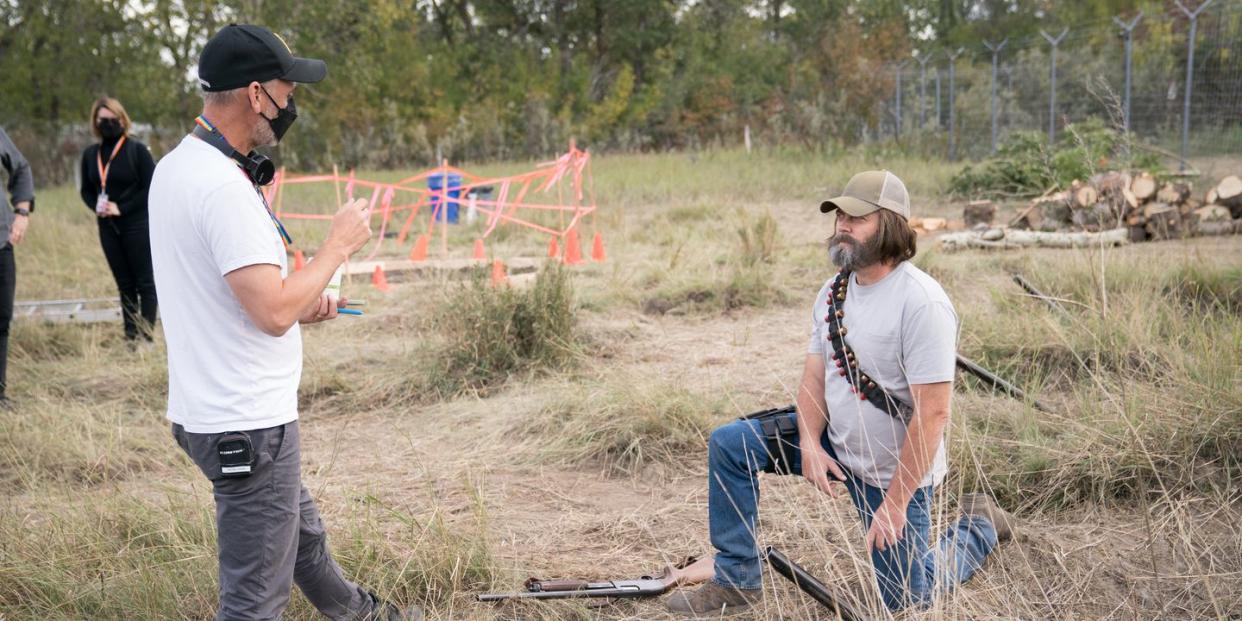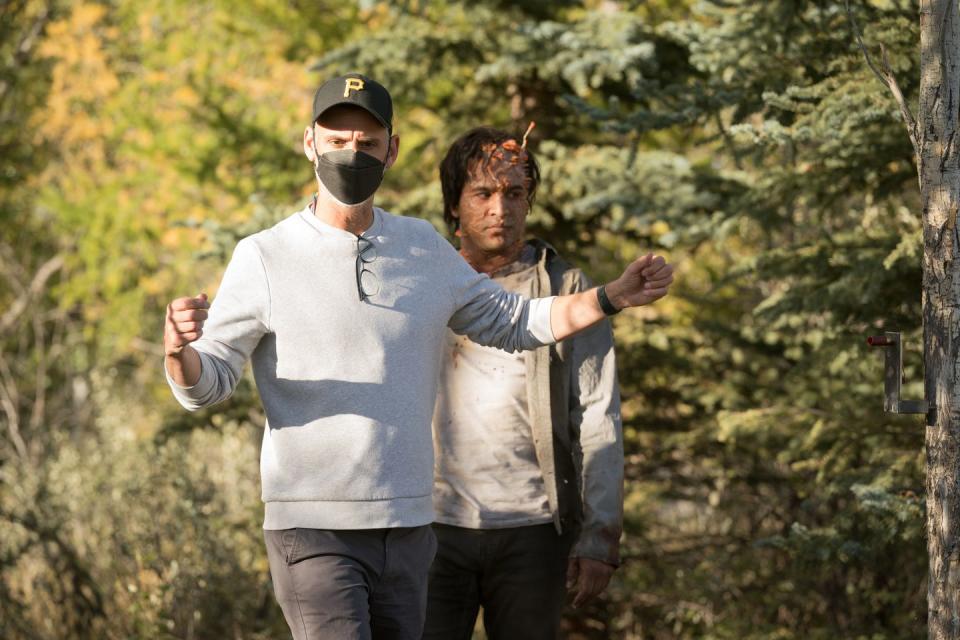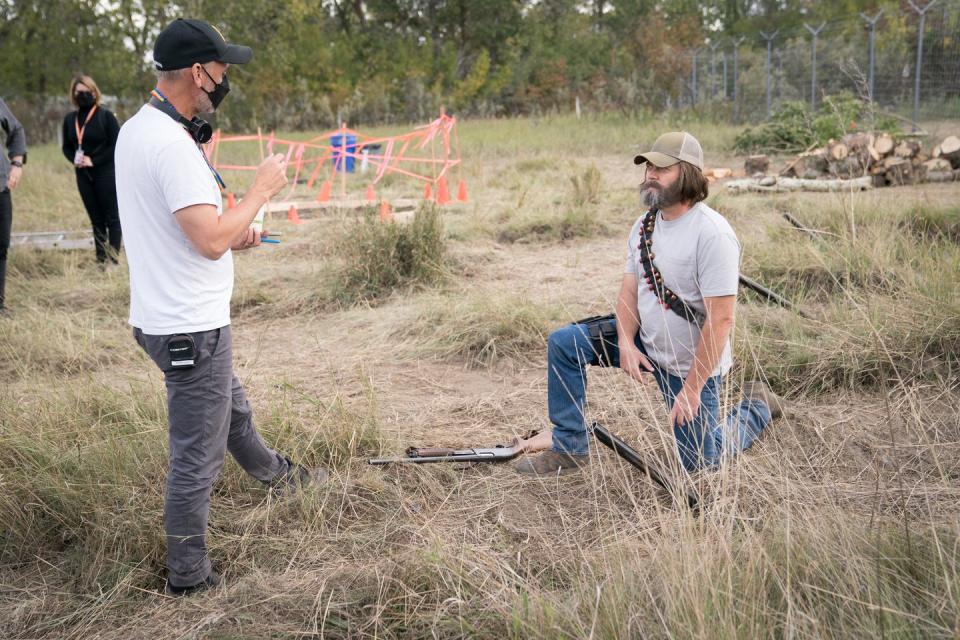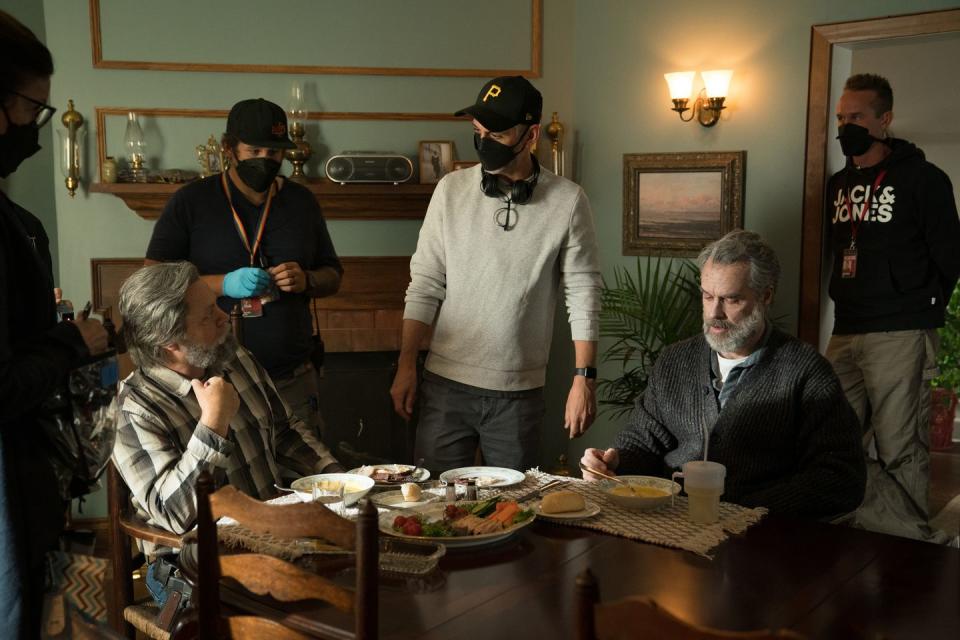How 'The Last of Us' Pulled Off One of the Decade's Greatest TV Episodes

Dry your tears yet? You sure? Either way, gather round—we're all here to recover together. After two episodes of introducing viewers to The Last of Us's fungus-ridden brand of post-apocalypse, Episode Three swerves way off the road—not only of the show's plot so far, but even the video game it's based on. We're introduced to the bearded survivalist, Bill (Nick Offerman), and a man named Frank (Murray Bartlett), who mistakenly stumbles upon Bill's lonely, quarantined kingdom. Where the video game suggests that these two men had a major falling out, HBO's The Last of Us rewrote the script—showing the unlikely couple falling in love.
The result? A nearly hour-and-a-half long bottle episode spanning 20 years, feeling very much like Shakespeare tried his quill at a post-apocalyptic tale. Offerman and Bartlett, two superb performers in their own right, join forces—singing, cooking, fighting, crying, and loving their way through what's easily one of this young decade's best episodes of television. Of course, we wanted the story of how it all came to be. So we called up the director of the episode, Peter Hoar (The Umbrella Academy, Daredevil), to get the behind-the-scenes treatment. Here's how Episode Three of The Last of Us came to be—in Hoar's words.
How It All Started
When I first spoke to [series executive producer and writer Craig Mazin], he had already crafted [the story], but it was a question of how I would work with him and bring it to life. At that point, Murray was actually our first choice. He was already part of the show, but we were still looking for Bill. And with an actor the stature of Nick Offerman, you just have to ask.
Everyone gets a bit touchy about computer games. Any adaptation is a version of it. It's not the same thing. It would be very boring if it was just the whole gameplay without any interactivity. So the manipulation happens the other way. It's about us manipulating you emotionally, as opposed to you following your journey and finding out how that feels as you go. So really, Frank and Bill's story was the first best time to do that, because you meet Bill in the game as you're running through surviving, killing clickers, all the rest of it. This man hanging from the rafters is called his partner, Frank.
And I remember when I played it, I didn't quite take that in. I didn't think partner. Oh, got to be his boyfriend. I just thought business partner, because Bill's Bill. And then you find the stash of porn under the car seat—and it's like, oh, right. But I think it's such a relentless pace that you don't really take it in, or God, growing up as a gay man, sometimes I think those things are a trick and I shouldn't admit to seeing them, because someone will come along and go, "No, don't admit it. Don't catch him." So I think I just went on playing the game. I had to re-find all of that with my DP, Evan. We rewatched that section. It's tiny, really, in the scheme of the game. But then Craig comes along and says, "I just want to explode that bit. I want to tell the story."

On Murray Bartlett and Nick Offerman's Intimate Scenes
I've talked a bit about the meta-ness of this whole situation, where Murray Bartlett has played a gay man. Murray Bartlett is a gay man. Murray Bartlett has done scenes in bed with other men. And so when we got to that scene in particular, it was life informing art because he was saying, "Don't worry, you'll be okay. I'll look after you. I'll be nice to you. Don't be nervous." And Nick was nervous, not because he was in bed with a man, but nervous because it meant so much. What Nick did really well is he guarded himself in so many ways as Bill. When the cracks appear and the emotion starts, he does such a beautiful job on these little things. And the things that I, as a gay man, might notice that he does are a bit fussy. Moving the plate, turning the plate round a few times.
Play Me a Song, You're the Survivalist Man...
We shot [Bill singing to Frank] live, so that's his voice recorded live. Craig was quite particular about the cadences in the song, why he picked that song, and why it had to sound the way it should sound. Because of course, we had Murray doing it badly and then Nick doing it well. And Nick's not a singer. I think some of the requests regarding cadence were quite complicated. They were for me. And I just thought, Nick, just do it with your heart and love it and just be relaxed. And he did. And we shot it with three cameras, so we didn't have to re-shoot angles. I was worried because I was facing away from the windows— and that meant visually, it wasn't as pretty as if we'd have gone the other way. But of course, if I had, you wouldn't have seen anything. It worked really well. You've got the sun in Murray's eyes and the little tear that comes out. He's so soft.

That Set!
That was one of the great challenges practically—to surround this set that we'd already built with this fencing, and then to build these pipes and these grinders that would pull the gas and make this flame appear. That was one part of it [and] the big hole that he dug and the electrified things. And Nick Offerman knows all of it. Every time we would show him something, he'd go, "Oh, I see how you worked that. That's really clever, but what about if you did this?" He knew his stuff. So of course, we realized how perfect he was to play Bill. It was a joy to be able to tell the story of The Last of Us without talking about Joel and Ellie, actually. That's quite unique. Not many shows would be brave enough to do that.
On the Episode Relating to the Franchise's Larger Themes of Sexuality
Well, you know what? I think [The Last of Us creator Neil Druckmann] listens. Neil understands his game. He understands his public. And I think he probably thought, I have opened some things for gamers out there, which maybe he didn't expect. And maybe he thought, Let's talk about characters you don't normally see, Bill being one of them. Obviously, Ellie's sexuality is discussed partly, and then there's the left behind thing. So it builds and builds and builds. But I do think they saw that people love to own these characters. I think Ellie is one of the most popular LGBTQ characters out there.

A Spinoff For Nick Offerman's Bill, Anyone?
Honestly, Bill's got legs. Obviously we see a little moment where they are working with Joel and Tess. And we see the scene where they first meet—but then it's a good few years of them working together and understanding each other. Maybe that's the section that you do as a spinoff, where it's action-packed and whatever. Or rather than a spinoff series, maybe it's just a spinoff of Bill, and it's just digging into that one moment.
I'd love to do something with Joel in the middle. You'd learn a lot about him mid-apocalypse, because obviously Pedro [Pascal] came on without all the gray in his hair, and he looked fabulous. I just thought, Wow, that's a Joel I don't know. There's only that one scene [in Episode Three]. It was intriguing to me what they were up to in that period because they probably think, OK, we've got this. We're making the apocalypse work for us. We've got a little scheme going on here. But as everyone knows—best-laid plans.
You Might Also Like